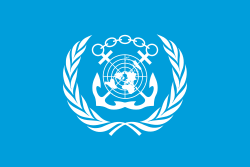International Maritime Organisation
|
International Maritime Organization |
|
 |
|

The IMO flag
|
|
| Abbreviation | IMO / OMI |
|---|---|
| Formation | 1959 |
| Type | Specialised agency |
| Legal status | Active |
| Headquarters | London, United Kingdom |
|
Head
|
Kitack Lim |
| Website | www.imo.org |
| Formerly Inter-Governmental Maritime Consultative Organization | |
International Maritime Organization
The International Maritime Organization (IMO), known as the Inter-Governmental Maritime Consultative Organization (IMCO) until 1982, is a specialised agency of the United Nations responsible for regulating shipping. The IMO was established in Geneva in 1948 and came into force ten years later, meeting for the first time in 1959. Headquartered in London, United Kingdom, the IMO has 172 Member States and three Associate Members.
The IMO's primary purpose is to develop and maintain a comprehensive regulatory framework for shipping and its remit today includes safety, environmental concerns, legal matters, technical co-operation, maritime security and the efficiency of shipping. IMO is governed by an assembly of members and is financially administered by a council of members elected from the assembly. The work of IMO is conducted through five committees and these are supported by technical subcommittees. Other UN organisations may observe the proceedings of the IMO. Observer status is granted to qualified non-governmental organisations.
IMO is supported by a permanent secretariat of employees who are representative of the organisation's members. The secretariat is composed of a Secretary-General who is periodically elected by the assembly, and various divisions such as those for marine safety, environmental protection and a conference section.
Inter-Governmental Maritime Consultative Organization (IMCO) was formed to fulfill a desire to bring the regulation of the safety of shipping into an international framework, for which the creation of the United Nations provided an opportunity. Hitherto such international conventions had been initiated piecemeal, notably the Safety of Life at Sea Convention (SOLAS), first adopted in 1914 following the Titanic disaster. IMCO's first task was to update that Convention; the resulting 1960 Convention was subsequently recast and updated in 1974 and it is that Convention that has been subsequently modified and updated to adapt to changes in safety requirements and technology.
When IMCO began its operations in 1959 certain other pre-existing instruments were brought under its aegis, most notable the International Convention for the Prevention of Pollution of the Sea by Oil (OILPOL) 1954. The first meetings of the newly formed IMCO were held in London in 1959. Throughout its existence IMCO, later renamed the IMO in 1982, has continued to produce new and updated instruments across a wide range of maritime issues covering not only safety of life and marine pollution but also encompassing safe navigation, search and rescue, wreck removal, tonnage measurement, liability and compensation, ship recycling, the training and certification of seafarers, and piracy. More recently SOLAS has been amended to bring an increased focus on maritime security through the International Ship and Port Facility Security (ISPS) Code. The IMO has also increased its focus on air emissions from ships.
...
Wikipedia
